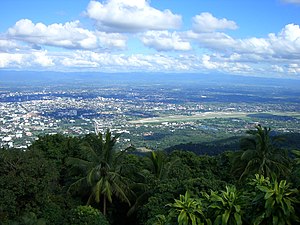Chiang Mai, Thailand -
 Image by Getty Images via Daylife
Image by Getty Images via Daylife
Forget about elephants, Buddhist temples and exotic hill tribes. The great hope for tourism in Chiang Mai, the 'Rose of the North' and fountainhead of Thai culture, is a small, mouse-like baby panda of Chinese descent.
On May 27 Lin Hui, a female panda on loan to the Chiang Mai Zoo from China, gave birth to a tiny, rat-like pink female panda. It has since gained its distinctive black and white colours.
The birth was the result of artificial insemination, which the zoo had to resort to after Chuang Chuang, an 8-year-old male panda also on loan from China, refused to copulate with Lin Hui.
Chiang Mai Zoo vets at one point resorted to showing Chuang Chuang panda pornography, but to no avail.
Thailand is the only South-East Asia country to have been provided a panda pair from China.
With Chiang Mai's tourism industry in a slump, the birth is being milked for all it is worth.
'The baby panda is Chiang Mai's big hope,' Chiang Mai Zoo's assistant director Wanchai Tunwattana said.
The city is planning 'welcome baby panda' parades on July 4-6, with marching bands from various Chiang Mai schools, and in mid-August will sponsor a special naming event for the little cub, to be held in Bangkok.
The cub, which is still kept in a nursing room with its mother, will be put on public display by October.
The panda-naming ceremony will be in Bangkok because most government ministers would not dare come to Chiang Mai, a political stronghold of fugitive former prime minister Thaksin Shinawatra, who was born in the northern city.
Thaksin, who was prime minister between 2001-06, went out of his way to promote Chiang Mai, 700 kilometres north of Bangkok, as a major tourist attraction for Thailand.
His deputy prime minister Chavalit Yongchaiyudh persuaded China to lends Chuang Chuang and Lin Hui to Chiang Mai Zoo in October 2003.
During Thaksin's premiership Chiang Mai also launched the Night Safari attraction in 2005, and held the International Horticultural Exposition in 2006.
Thaksin was ousted by a coup in September, 2006, but that did put an end to the Chiang Mai promotion.
In December 2008, a short-lived pro-Thaksin government led by his brother-in-law, Prime Minister Somchai Wongsawat, planned to hold a summit of the Association of South-East Asian Nations (ASEAN) in Chiang Mai, before the event was cancelled by anti-government protests that shut down Bangkok's two airports.
Since last year, tourism in Chiang Mai has been hard-hit by a number of factors including the global economic crisis, H1N1 and Thailand's political crisis
 Image via Wikipedia
Image via Wikipedia
'The people from Bangkok don't come to Chiang Mai because they want to punish us,' said Vorapong Muchaotai, secretar
y-general of the Chiang Mai Tourism Business Association.
While Chiang Mai is known to be pro-Thaksin, Bangkok is the main stronghold for the anti-Thaksin movement.
Thaksin's red-shirted supporters in Chiang Mai haven't helped matters. Whenever a minister from the current cabinet under Prime Minister Abhisit Vejjajiva travels to Chiang Mai for an event, he is likely to be pelted by rotten eggs and hounded out of town.
The reception has cut into Chinag Mai's convention activities.
'Many of the big conventions want ministers for their opening ceremony, but none will come up here because of the red-shirts,' said Kanog Suvannavisutr, president of the Thai Hotels Association Northern Chapter.
The once-charming city of temples, cultural attractions and quaint riverside guest houses has developed rapidly over the past two decades. It now boasts 700 hotels with about 30,000 hotel rooms, heavy traffic and fast-food outlets.
 Image via Wikipedia
Image via Wikipedia
Over-pricing and over-building during the Thaksin years scared many foreign tourists away.
'We've used up all our merit,' Vorapong said, referring to the Buddhist concept of amassing merit for the next life.
While Chiang Mai used to earn about 40 billion baht (1.16 billion dollars) from tourism five years ago, similar to amount then earned by Phuket and Pattaya beach resorts, last year the city's tourism revenues fell to less than 30 billion, compared with Phuket's 100 bullion baht and Pattaya's 70 billion, Vorapong said.
In the first five months of 2009, arrivals have been down 20 per cent, he said. Hotels are operating at occupancy rates of less than 20 per cent.

![Reblog this post [with Zemanta]](http://img.zemanta.com/reblog_e.png?x-id=2300be31-da96-4a53-a0e7-6919ce2ab4af)
No comments:
Post a Comment